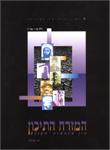|
Discipline:
Humanities
Topic: World History
The Middle East between the World Wars
|
Haggai Erlich
|

|
These five volumes survey the history of the Middle
East from the aftermath of WW I to the end of WW II. They deal primarily
with Egypt, Iraq, Trans-Jordan, Lebanon, Syria, the Arabs of Palestine and
the Arab Peninsula states. They also relate to the countries bordering on
the region: Turkey, Iran, the Nile countries and North Africa. The volumes
analyze the "Parliamentarian" 1920s and "The Crisis of the
1930s", focusing mainly on the dynamism of inter-generational tensions
as a key to sociopolitical and ideological changes.
|
|
In so doing, the series surveys developments in
each of the major countries, but also attempts to recount the history of
the region as a whole, as the home of a common Islamic-Arab civilization.
It ends with a discussion of the changes produced by World War II and the
momentum it created for processes which shaped the Middle East from the
1950s to the present.
Volume 1: The spirit of the 1920s (1992,
312 pp., cat. # 10425-1)
Volume 2: The British Mandate countries in
the 1920s (1993, 448 pp., cat. # 10425-2)
Volume 3: The French Mandate countries in
the 1920s (1994, 516 pp., cat. # 10425-3)
Volume 4: The 1930s - Crises and rebellion
(1996, 368 pp., cat. # 10425-4)
Volume 5: World
War II - History in parentheses (2003, 479 pp., cat. # 10425-5)
|
|
|
Professor Haggai Erlich, of the
Department of Middle Eastern and African History at Tel Aviv University and
the History Department at the Open University of Israel, is author of 10
books, among them Ethiopia and the Middle East (Lynne Rienner, 1994)
and The Cross and the River – Ethiopia, Egypt and the Nile (Lynne
Rienner, 2002) and co-editor of The Nile – Histories, Cultures, Myths
(Lynne Rienner, 2000).
|

For additional
information, contact the Rights and Permissions
Department.
|